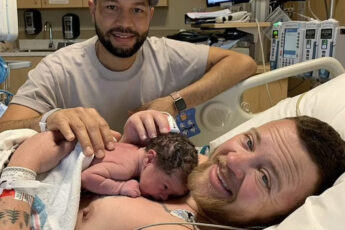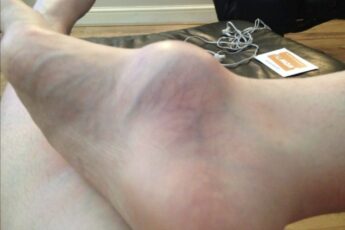I Found a Little Girl on the Pier With No Memory After a Typhoon and Took Her In. Fifteen Years Later, a Ship Arrived Carrying Her Mother
The sea breeze toyed with Marina’s hair, tangling the golden strands as she narrowed her eyes against the late afternoon sun and added another stroke to her canvas.
Azure spilled into indigo, shifting into that elusive shade of water just before dusk — a color that seemed almost alive, always near and yet forever beyond reach, like light slipping through cupped hands.
Marina had turned twenty, yet the sea remained a mystery to her: a riddle, a secret, a voice that never stopped calling.
Behind her, Anna moved silently, as softly as a shadow, and rested her chin on her daughter’s shoulder. She breathed in the familiar scents of turpentine, salt, and the sea. Her presence carried with it the sweetness of ripe peaches and the safety of home.
“Too dark,” she whispered gently. There was no judgment in her tone — only care. “The sea is calm today.”
Marina smiled faintly, her eyes still on the canvas.
“I’m not painting the sea,” she said. “I’m painting how it sounds in my memory.”
Anna’s hand lingered in her daughter’s hair. Fifteen years had passed since the night she and her husband Viktor had found a child on the pier after the storm — a girl soaked to the bone, shivering, eyes wide with fear, like two fragments of a raging sky. A girl with no name, no past, no memory. A child tossed ashore like a broken splinter of some forgotten ship.
They had chosen the name Marina. Slowly, it grew into her — like it had been hers all along.
In the beginning, they had waited. A week. A month. A year. Notices were posted, the police were contacted, questions were asked in every port and every nearby town. But no one was searching for a little girl with storm-colored eyes. It was as though she had been dropped from the heavens — or abandoned by the sea itself.
“Your father’s back with the catch,” Anna said softly, nodding toward the house. “He says the flounder all but jumped into the nets.”
Out in the yard, Viktor was already tending the fire beneath the grill, his booming laughter rolling across the garden like music. He adored Marina — not simply as a daughter, but as a gift. A gift the sea had returned to him, after years of despair over the children he and Anna could never have.
Their life unfolded evenly, like the streams that slipped between the coastal cliffs. Summers were filled with gardening, shared meals on the veranda to the chorus of cicadas, and evenings when the sky blazed gold. Winters were quiet — patching nets by the fire, warmth under wool blankets, and Marina reading aloud, carrying them away into imagined worlds. Of course, there were quarrels too — over chores, over the flowers that dried in their pots, over the young doctor from the village hospital who sometimes lingered too long when Marina passed. Viktor dreamed she would stay forever, close to them, bound to the sea. Anna, in secret, tucked away small savings — money for an art academy far beyond the village. She knew Marina’s talent deserved wings.
But always, disagreements dissolved like morning mist the moment they sat at the same table.
One evening, Marina set her brush aside and turned to Anna.
“Mom… have you ever regretted it?”
Anna’s gaze held hers — steady, warm, deep. Within it lived both the fear of those first days and a love so boundless it could hold back tides.
“Not for a single second, my girl,” she whispered. “Not one.”
She folded Marina into her arms, inhaling the familiar scent of oil paint and salt. And in that embrace, Anna realized how fragile their world was — the house, the garden, this child — as delicate as a painting on canvas. She would guard it fiercely, no matter what storms lay ahead.
It was Viktor who pushed Marina toward the regional art competition. One morning, he jabbed a dirt-streaked finger at the newspaper.
“Look here, Marinka. Your chance. Show them what you can do.”
Marina resisted. To lay bare her feelings on canvas before strangers was like undressing before a crowd. But then Anna’s eyes met hers — eyes that pleaded, that believed, that hoped.
“Try,” she said softly. “If not for yourself, then for us.”
So Marina tried. She locked herself in her small studio for days. And then, one late night, inspiration finally came.
She would not paint what she saw. She would paint what she felt.
Two hands — Viktor’s, rough and strong, cradling a tiny seashell. And over his, Anna’s, gentle and protective, as though guarding something impossibly fragile. She named it “Harbor.”
The painting won — unanimously. The district paper ran a full feature, with Marina blushing beside her work. The article praised her gift — and mentioned, almost casually, the story of the girl who had been found on the pier after a storm and raised by a fisherman and his wife.
The village celebrated. But in the weeks that followed, Marina began to notice unsettling things. A sleek black car passing slowly by their gate. The prickle of unseen eyes when she painted on the cliffs. And one evening, as she returned home, she found Anna waiting on the porch — pale, trembling, clutching an envelope of thick, perfumed paper without a return address.
“It’s for you,” Anna whispered, her voice unsteady.
Marina opened it. Inside was a single sheet, heavy with the scent of lilies, inked in graceful handwriting:
“Hello. Your name is Marina, but when you were born, your father and I named you Anastasia. My name is Elena. I am your mother.”
Marina read the line once. Then again. The words blurred, her chest tightening like a knot pulled too hard. Slowly, she lifted her eyes to Anna — searching, desperate for reassurance. But in her mother’s face, she saw not answers, only the same dread.
The letter continued, unraveling like a nightmare: a yacht, a sudden storm, a desperate search that ended in nothing but loss…
And now, fifteen years later, the sea had carried back what it once tried to take.
The letter shook in Marina’s hands. Each line told a story too terrible to grasp.
A yacht. A sudden squall that ripped the sky apart. The frantic screams. Her mother clutching her, then the waves tearing them apart. When Elena awoke in a hospital days later, her baby was gone. Divers searched. Boats combed the shoreline. But nothing. The sea had swallowed Anastasia whole.
Until now.
Marina lowered the paper slowly. “Mom…” she whispered, her voice cracking — but she wasn’t speaking of Elena. Her eyes searched Anna’s face, the woman who had picked her up broken and nameless from the shore. “What does this mean?”
Anna’s lips trembled. She reached out, cupping Marina’s cheeks with both hands, her eyes brimming. “It means… you had another life before us. But you are my daughter. No one can take that away.”
For a moment, silence hung heavy, broken only by the distant crash of the tide.
But silence didn’t last.
The very next evening, the ship arrived — a gleaming white vessel that dwarfed the fishing boats in the small harbor. From its deck stepped a woman in a flowing dress, her hair pinned in an elegant knot, pearls glistening at her throat.
Elena.
The crowd gathered, whispering. All eyes turned as she descended the gangway, clutching her purse as though it were her only anchor. And then her gaze found Marina. She froze.
“My child,” Elena breathed. Her voice trembled, rich with disbelief and longing. “My Anastasia…”
Marina felt Anna’s hand slip into hers, warm, steady, grounding. Behind her, Viktor’s solid presence stood like a wall.
Elena moved closer, tears streaming. She reached out as though afraid the girl might vanish if she blinked. “I searched… I never stopped searching. The sea stole you from me. Please — come home.”
The crowd murmured. Anna’s grip tightened. Viktor’s jaw clenched.
Marina’s chest rose and fell as though she’d run miles. She looked at Elena — the woman whose blood ran in her veins, whose eyes mirrored her own. And then at Anna — the woman who had wiped her tears, mended her scraped knees, sat by her bedside during fevers, and whispered lullabies until morning.
Home. Where was it?
Her throat tightened, and finally she spoke. “I may have been born Anastasia… but the sea gave me back as Marina. And Marina is who I am.”
Elena’s face crumpled, torn between heartbreak and love. Anna pulled Marina into her arms, her voice steady though her own tears flowed.
“She belongs here. With us. But if you wish to know her, to be part of her life — that will be her choice.”
The three women stood there, framed by the restless sea — past, present, and future colliding. And Marina, with tears streaking her face, realized something profound: she did not have to choose one family over the other.
The sea had once tried to take everything. But now, it had given her two mothers.
And sometimes, love is not divided — it is multiplied.







